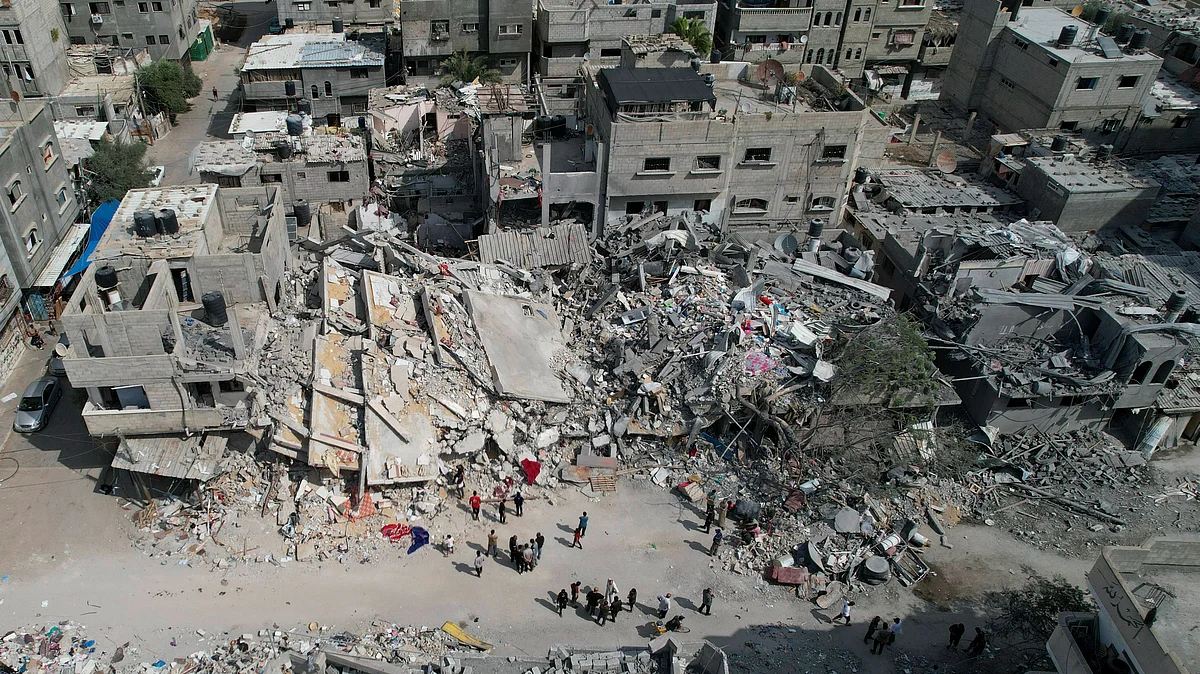
The Israel-Hamas Ceasefire Is Indeed Good News But Only if It Holds
The agreement is the culmination of negotiations conducted over a year among stakeholders in different countries.

advertisement
Israel and Hamas have finally reached an agreement for a ceasefire and hostage exchange deal. The world has heaved a sigh of relief, in anticipation of the end to unspeakable brutality heaped on each side by the other.
First, a bit about the deal itself. The deal was announced on Wednesday, 15 January, in Doha, where negotiations had been on between Israel, Hamas, the US, Egypt, and Qatar. The Gaza ceasefire will take effect on 19 January, Qatar’s Prime Minister and Foreign Minister Sheikh Mohammed bin Abdulrahman Al Thani said in a press conference in Doha on Wednesday.
Also, about 600 trucks will deliver humanitarian aid to the Gaza Strip daily.
The second phase would involve the release of all remaining living hostages, including male soldiers, as well as any remaining Israeli forces withdrawing from Gaza. The temporary ceasefire is expected to become permanent at this stage.
The third phase would include returning the remains of hostages who have been killed to their families and a "major reconstruction plan" for Gaza.
While the deal was announced on Wednesday, Israeli and Hamas negotiating teams signed a Gaza hostage release and ceasefire deal in Doha only on Friday morning, after the final hurdles stalling finalisation of the agreement were cleared. At the time of writing this article, Israel's security cabinet has been convening to vote on it.
Deal Reached After Painstaking Efforts
The agreement is the culmination of more than a year of negotiations between all the stakeholders in different capitals of the world. It is imperative that the agreement works out this time.
The conflict has been raging on for more than a year, and it has not remained entirely localised – between Hamas and Israel – but has spilled over into Lebanon, Syria, Yemen, and, in a limited manner, Iran.
It has disrupted ordinary life not just for Israelis and Palestinians but for millions of people across the world due to trade and travel disruptions, besides taking a huge human toll.
The conflict began with Hamas perpetuating atrocities with its multipronged attacks on Israeli citizens. It did not distinguish between old and young, men and women, abled and disabled, Israelis and non-Israelis. Besides those who died in the attacks, the hostages taken by Hamas included the elderly and toddlers – many of whom are dead.
What did it bring to Hamas, and the people of Gaza, whom Hamas professes to serve?
The World Health Organization (WHO) estimated that $10 billion is needed to rebuild Gaza's health facilities alone. This is only what is apparent, the allied and hidden cost will be much more. Hamas has been badly battered and degraded. Most of its leaders have been eliminated. The rejoicing in Gaza as news of the deal broke should tell Hamas, or what remains of it, what and how the people of Gaza feel over this round of conflict.
The Cost of War
For Israel, the disproportionate response to the Hamas attacks is no less. Apart from the loss of lives amongst the hostages, 405 Israeli soldiers have been killed in the ground operations in Gaza alone.
Last week, Israeli business newspaper Calcalist reported that the cost of Israel's war in Gaza reached approximately 250 billion shekels ($67.57 billion) by the end of 2024. Israel has lost out on foreign investments and tourism. Furthermore, the International Criminal Court has released an arrest warrant for Prime Minister Benjamin Netanyahu on charges of genocide, and many Israeli soldiers also run the risk of being arrested for war crimes.
In days to come we will know more details on how, why, and in what manner the deal was reached. Undoubtedly, it will be a victory of sorts for the Trump administration which will not have to deal with getting a ceasefire in place, if the deal holds. Trump may also boast that his warning for the release of hostages has not fallen on deaf ears.
There are, however, other factors that should be kept in mind.
Israel would not have kept up its siege and onslaught in Gaza had it not have had tacit Arab support. Hamas was backed by Iran and Qatar, both regional rivals of Sunni Gulf states like the UAE, Bahrain, Saudi Arabia and Egypt. Together with Hamas, Iran's other Shiite protégé in the region like Hezbollah had also been deranged. In a domino effect, this led to the fall of the Iran- and Russia-backed regime of Bashar al-Assad in Syria, and Israel managed to occupy a significant part of Syrian territory. Iran has effectively been elbowed out at least for now from the Levant.
There is no alternative to it for sustainable peace in the region.
(Aditi Bhaduri is a journalist and political analyst. She tweets @aditijan. This is an opinion piece. The views expressed above are the author’s own. The Quint neither endorses nor is responsible for the same.)
- Access to all paywalled content on site
- Ad-free experience across The Quint
- Early previews of our Special Projects
Published: undefined